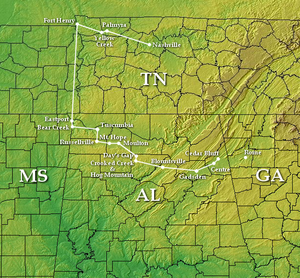80th Illinois Infantry Regiment
The 33rd Brigade, including the 80th Illinois, were initially charged with guarding the artillery, called Parsons' battery, on the Open Knob, a prominent hill on the northern end of the battlefield facing the Confederate's right flank.
Confederate Gen. Braxton Bragg's Army of Mississippi[b] arguably won a tactical victory, having fought aggressively and pushed his opponent back for over a mile.
The raid, led by Colonel Abel D. Streight, was intended to destroy parts of the Western and Atlantic railroad, which was supplying the Confederate Army of Tennessee.
After surrendering and being informed of the deception Streight reputedly demanded his arms back for a proper fight, a request cheerfully declined by Forrest.
While the officers largely remained imprisoned for the remainder of the war, the enlisted men were sent to City Point before being exchanged for Confederate prisoners.
This advance was part of the Union Army of the Tennessee under Maj. Gen. William T. Sherman maneuvering to launch a surprise attack against Bragg's right flank on Missionary Ridge.
Meanwhile, on 24 November, Eastern Theater troops on the opposite side of the line under Maj. Gen. Joseph Hooker defeated the Confederates in the Battle of Lookout Mountain and began a movement toward Bragg's left flank at Rossville.
Hoping to distract Bragg's attention, Grant authorized Thomas's army to advance in the center of his line to the base of Missionary Ridge.
A combination of misunderstood orders and the pressure of the tactical situation caused Thomas's men to surge to the top of Missionary Ridge, routing the Army of Tennessee, which retreated to Dalton, Georgia, fighting off the Union pursuit successfully at the Battle of Ringgold Gap.
Bragg's defeat eliminated the last Confederate control of Tennessee and opened the door to an invasion of the Deep South, leading to Sherman's Atlanta Campaign of 1864, of which the 80th Illinois also took part.
The campaign under the ultimate direction of Union Maj. Gen. William T. Sherman involved a large invading force into Georgia from the vicinity of Chattanooga, Tennessee, and was opposed by the Confederate general Joseph E. Johnston.
In July, the Confederate president replaced Johnston with the more aggressive John Bell Hood, who began challenging the Union Army in a series of damaging frontal assaults.


